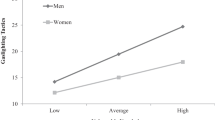Abstract
This study investigated how marital relationship difficulties might be transmitted from parents to their late adolescent children's romantic relationships. Measures of perceived interparent conflict, styles of subject-parent conflict behaviors, and styles of subject-boyfriend/girlfriend conflict behaviors as well as a measure of general relationship difficulties were obtained from samples of 144 female and 79 male 18–19-year old college students. Subjects tend to use the same styles of conflict behavior with their boyfriends/girlfriends as with their parents. Path analyses showed that perceived interparent conflict is associated with avoidant, verbally aggressive, and for females, physically aggressive styles of conflict behavior with parents, and that some of these subject-parent conflict behavior styles are related to general relationship difficulties. The avoidance style is especially important in mediating between interparent conflict and the son's or daughter's relationship difficulties.
Similar content being viewed by others
References
Ainsworth, M., Blehar, M., Waters, E., and Wall, S. (1978).Patterns of Attachment. Erlbaum, Hillsdale, NJ.
Arend, R., Gove, F. L., and Sroufe, L. A. (1979). Continuity of individual adaptation from infancy to kindergarten: A predictive study of ego-resiliency and curiosity in preschoolers.Child Develop. 50: 950–959.
Burger, A. L. (1987). The relationship between parental divorce, quality of the father-daughter relationship, and heterosocial functioning in college females. Unpublished doctoral dissertation, University of North Carolina, Chapel Hill.
Chess, S., Thomas, A., Korn, S., Mittelman, M., and Cohen, J. (1983). Early parental attitudes, divorce and separation, and young adult outcome: Findings of a longitudinal study.J. Am. Acad. Child Psychiat. 22: 47–51.
Coleman, M., Ganong, L. H. and Ellis, P. (1985). Family structure and dating behavior of adolescents.Adolescence 20: 537–543.
Elder, G. H., Caspi, A., and Downey, G. (1986). Problem behavior and family relationships: Life course and intergenerational themes. In Sorensen, A., Weinert, F., and Sherrod, L. (eds.),Human Development and the Life Course: Multidicisplinary Perspectives. Erlbaum, Hillsdale, NJ.
Emery, R. E. (1982). Interparental conflict and the children of discord and divorce.Psychol. Bull. 92: 310–330.
Emery, R. E., and O'Leary, K. D. (1984). Marital discord and child behavior problems in a nonclinic sample.J. Abnorm. Child Psychol. 12: 411–420.
Greenberg, E. F., and Nay, W. R. (1982). The intergenerational transmission of marital instability reconsidered.J. Marriage Family 44: 335–347.
Hazlett, S. (1988). The intergenerational transmission of conflict engagement behaviors. Unpublished masters thesis. University of North Carolina, Chapel Hill.
Hoffman, J. A. (1984). Psychological separation of late adolescents from their parents.J. Counsel. Psychol. 31: 170–178.
Hoffman, J. A. (1985). Presenting problems and family dynamics of college students. Unpublished doctoral dissertation, University of North Carolina, Chapel Hill.
Jorgenson, D. E. (1985). Transmitting methods of conflict resolution from parents to children: A replication and comparison of blacks and whites, males and females.Social Behav. Personal. 13: 109–117.
Kalmuss, D. (1984). The intergenerational transmission of marital aggression.J. Marriage Family Ad 46: 11–19.
Long, N., Forehand, R., Fauber, R., and Brody, G. H. (1987). Self-perceived and independently-observed competence of young adolescents as a function of parental marital conflict and divorce.J. Abnorm. Child Psychol. 15: 15–27.
Margolin, G., John, R. S., and Gleberman, L. (1988). Affective responses to conflictual discussions in violent and nonviolent couples.J. Consult. Clin. Psychol. 56: 24–33.
Nelson, E. S. (1989). Conflict and satisfaction in dating relationships. Unpublished masters thesis, University of North Carolina, Chapel Hill.
Nye, I. F. (1957). Child adjustment in unbroken and in unhappy homes.Marriage Family Living 19: 356–361.
Offer, D., and Offer, J. B. (1975).From Teenage to Young Manhood. Basic Books, New York.
Rusbult, C. E., Johnson, D. J., and Morrow, G. D. (1986). Impact of couple patterns of problem solving on distress and nondistress in dating relationships.J. Personal. Social Psychol. 50: 744–753.
Schwarz, J. C., and Getter, H. (1980). Parental conflict and dominance in late adolescent maladjustment: A triple interaction model.J. Abnorm. Psychol. 89: 573–580.
Schwarz, J. C., and Zuroff, D. C. (1979). Family structure and depression in female college students: Effects of parental conflict, decision-making power, and inconsistency of love.J. Abnorm. Psychol. 88: 398–406.
Shaver, P. (1987). The study of love.Social Sci. 72: 120–123.
Steinmetz, S. K. (1977). The use of force for resolving family conflict: The training ground for abuse.Family Coord. 26: 19–26.
Straus, M. A. (1979). Measuring intrafamily conflict and violence: The conflict tactics (CT) scales.J. Marriage Family 41: 75–88.
Straus, M. A., Gelles, R., and Steinmetz, S. (1980).Behind Closed Doors: Violence in the American Family. Anchor Press, New York.
Wesley, W. A., and Epstein, N. E. (1970).The Silent Majority. Jossey-Bass, San Francisco.
Author information
Authors and Affiliations
Additional information
This research was supported in part by a grant from the University Research Council, University of North Carolina at Chapel Hill.
He obtained his Ph.D. degree at Stanford University and his current interests are in family interaction associated with disorded behavior.
Rights and permissions
About this article
Cite this article
Martin, B. The transmission of relationship difficulties from one generation to the next. J Youth Adolescence 19, 181–199 (1990). https://doi.org/10.1007/BF01537886
Received:
Accepted:
Issue Date:
DOI: https://doi.org/10.1007/BF01537886




